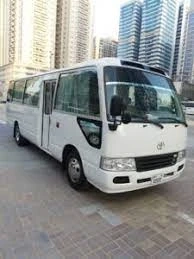Passengers transport by rented buses LLC help optimise resource planning, transport sustainability, multimodal transport, passenger services and work-life balance for drivers.
The new environment and challenges brought about by improved icr transport management worldwide mean that passenger transport is facing the need for digitisation, and to an even greater extent. Passenger transport in Dubai, as a critically important service, must significantly improve its operations through ICT (Information and Communication Technology) enhanced planning. Against this background, Goal Systems, a global leader in optimisation and planning software for the passenger transport industry, analyses the keys and advantages of planning on the road to smarter, more sustainable transport.
Optimised planning, key to profitability and savings:When it comes to advantages or benefits, the economic factor is unavoidable. Optimisation software used in the planning of urban and intercity transport (metro, bus or train) can help companies and administrations to reduce costs, in some cases by an average of 5% to 12%. In this way, there is a direct return on investment, a budget that can be used to improve other aspects of the business and, in the case of public administrations, to improve and expand services for a larger number of users and to adjust budgets.
Adapting the city's fleet.In terms of savings, optimised planning ensures that routes are serviced with a minimum number of vehicles without compromising the quality of service. The vehicles for transportation saved can be used to expand the network or timetable, thus increasing passenger satisfaction.
Better work-life balance for drivers.Drivers work long hours and often find it difficult to balance work with family, study or other activities. Planning tools must be able to combine optimal planning with social needs to better tailor work and rest time to the needs of each worker, thus bringing benefits in terms of daily work, shift management, holidays and driver absences. This planning must take into account as much as possible the needs and preferences of the employees and, of course, make it easier for them to consult schedules, changes and the distribution of their weekly or monthly schedules, which they can do conveniently from any mobile device with the help of these planning tools. Employee Benefits as a Source of Productivity.
Towards a smart city model.Optimised planning solutions involve an in-depth analysis of the many external and internal factors that imply an overall improvement in urban traffic management (demand, infrastructure, network, fleet size, human resources required for service. At the same time, by collecting and analysing the various types of data that affect planning, it is possible to make changes and improvements in real time and to open up new horizons based on realities and model predictions, thus facilitating informed decision-making.
Sustainability and emissions reduction commitments.Climate change is a tangible reality and transport, both personal and passenger, plays a key role in sustainability. The decarbonisation of cities is imperative and the transport sector is focusing on sustainability. The sector needs to utilise planning tools to reduce emissions and avoid significant impacts on ecosystems. Planning-focused technologies can select the most appropriate use of resources, the best routes and the most sustainable timetables, and make better use of the fleet. In addition, with the introduction of electric vehicles, public transport in Dubai contributes significantly to improving our environment by optimising the management of chargers and batteries in the most efficient way.
Better travelling experience.Correct and efficient vehicle planning can bring numerous benefits to passengers. Data management makes it possible to optimise station locations, interchange points, better connections, connections, timetables, etc., thus improving services. All this encourages users to travel by public transport.
Genuine multimodal transport.The combination of different modes of transport such as bus, underground, train or tram improves the quality of life in cities. It enables citizens to get from their front door to their destination comfortably and sustainably. Planning solutions help to ensure that the different modes of transport are coordinated and help citizens to minimise the number of transfers and waiting times according to their personal preferences and needs.
The UAE's icr transport network plays an important role in creating well-connected and sustainable cities. With an extensive, convenient, comfortable, safe and environmentally friendly bus network, the UAE offers reliable and affordable transport services. As the UAE grows and welcomes travellers from all over the world, icr's buses ensure efficient travel.


